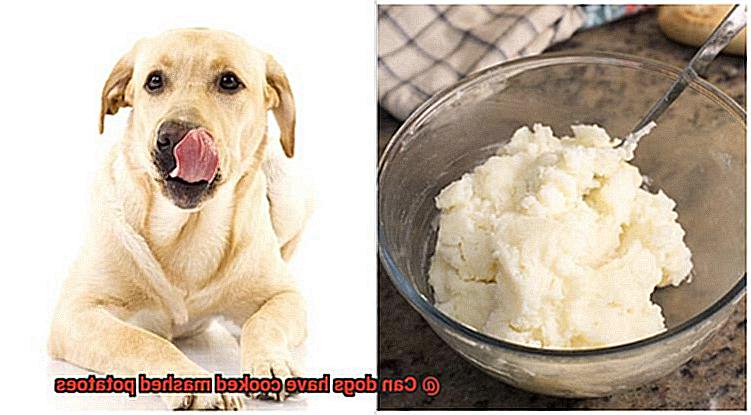Can dogs have cooked mashed potatoes?
Imagine this: your kitchen fills with the irresistible aroma of freshly cooked mashed potatoes. It’s comfort food at its finest, and you can’t help but wonder if your furry friend can partake in the deliciousness.
As a dog lover, sharing delightful culinary experiences with our beloved pets is only natural. However, when it comes to certain human foods, we need to exercise caution.
So, let’s address the burning question: can dogs safely have cooked mashed potatoes? Are those smooth, buttery mounds a potential treat for our four-legged companions, or could they lead to an unhappy tummy?
In this blog post, we’ll dive into the realm of canine nutrition and consult experts to uncover the truth behind this tantalizing mystery. Join us as we unlock the secrets and discover whether Fido can indulge in a bowl of fluffy potatoes alongside us or if it’s best to reserve this delectable dish strictly for human consumption.
So grab a cup of tea, get cozy, and embark on this scrumptious journey of exploration.
What Are The Benefits of Feeding Mashed Potatoes to Dogs?
Contents
- 1 What Are The Benefits of Feeding Mashed Potatoes to Dogs?
- 2 What Are The Risks of Feeding Mashed Potatoes to Dogs?
- 3 How Should You Prepare Mashed Potatoes Before Feeding Them to Your Dog?
- 4 How Much Mashed Potato Can You Give To Your Dog?
- 5 What Other Foods Should Be Avoided When Feeding Mashed Potatoes To Your Dog?
- 6 What Are Some Signs Of An Allergic Reaction To Mashed Potatoes In Dogs?
- 7 How Can You Monitor Your Dog’s Response To Eating Mashed Potatoes?
- 8 Conclusion
French Bulldogs are known for their adorable smushy faces and unique personalities. As a responsible dog owner, you want to ensure that your furry friend receives a balanced and nutritious diet.
While commercial dog food is essential, occasionally incorporating human food can be a tasty and healthy addition. One such food is mashed potatoes.
In this article, we will explore the benefits of feeding mashed potatoes to French Bulldogs and how to do it safely.
Nutritional Value:
Mashed potatoes can provide important vitamins and minerals that contribute to your French Bulldog’s overall health. Here are some key nutrients found in potatoes:
- Vitamin C: This antioxidant boosts the immune system and helps fight off illnesses.
- Vitamin B6: It aids in brain development, promotes healthy skin, and supports the nervous system.
- Potassium: Essential for maintaining proper muscle function, especially beneficial for French Bulldogs prone to muscle weakness or cramping.
- Fiber: Promotes healthy digestion and bowel regularity.
Energy Boost:
French Bulldogs are generally active dogs, and mashed potatoes can provide an energy boost. This is particularly useful if your Frenchie is highly active or needs to gain weight.
Low-Glycemic Option:
For French Bulldogs with certain medical conditions like diabetes or kidney disease, mashed potatoes can be a suitable low-glycemic option. However, always consult with your veterinarian before making any dietary changes.
How to Safely Feed Mashed Potatoes:
To ensure your French Bulldog’s safety and well-being, follow these guidelines:
- Use plain cooked mashed potatoes without added ingredients like butter, salt, garlic, or onions.
- Mash the potatoes thoroughly to avoid any choking hazards or digestive issues.
- Start by offering small portions and monitor your Frenchie’s response. If they tolerate it well, you can gradually increase the amount over time.
- Moderation is key. Mashed potatoes should only be given as an occasional treat and not replace their regular meals.
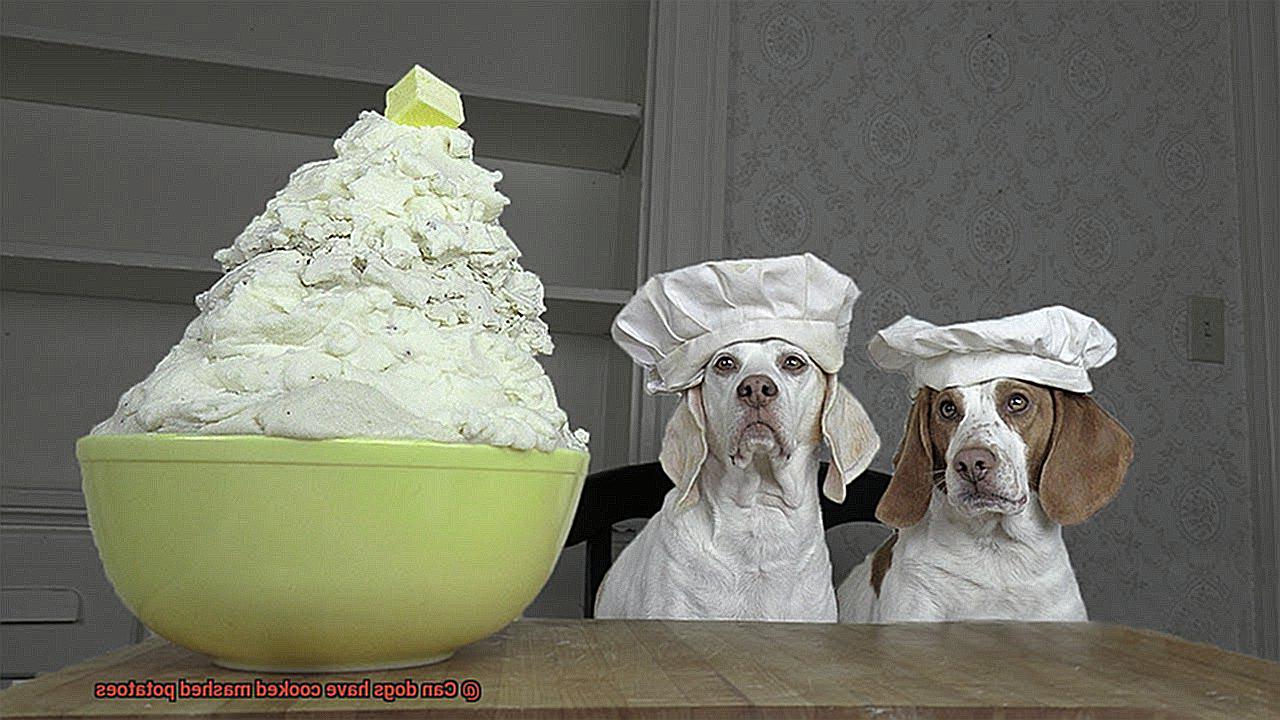
What Are The Risks of Feeding Mashed Potatoes to Dogs?
French Bulldogs, with their adorable smushy faces and unique personalities, are undeniably one of the most beloved dog breeds. As a proud Frenchie owner myself, I understand the temptation to share our favorite foods with our four-legged friends. But before you start doling out spoonfuls of mashed potatoes to your furry companion, it’s important to be aware of the potential risks involved.
- Carbohydrate Conundrum: Frenchies are prone to weight gain and obesity, so it’s crucial to watch their carbohydrate intake. Mashed potatoes, being starchy vegetables, are loaded with carbs that can pack on the pounds if consumed in excess. Stick to small portions and opt for plain mashed potatoes without added butter or cream.
- Digestive Dilemmas: French Bulldogs have sensitive stomachs, and their digestive systems may struggle to handle large amounts of potatoes. Feeding your Frenchie excessive mashed potatoes could result in stomach upset, including diarrhea or constipation. No one wants to clean up that mess.
- Allergy Alert: Just like humans, dogs can have allergies or sensitivities to certain foods. If your furry friend has a known food allergy or sensitivity, it’s best to avoid feeding them mashed potatoes altogether. Keep an eye out for symptoms like itching, rashes, upset tummy, or even respiratory issues.
- Toxic Tidbits: Beware of the seasoning and additives that may be present in mashed potatoes. Garlic, onions, and other seasonings commonly used in human recipes can be toxic to dogs. These ingredients can damage your Frenchie’s red blood cells and lead to anemia. Stick to plain mashed potatoes without any harmful additives.
- Portion Patrol: While a small amount of plain mashed potatoes may not pose significant risks, overfeeding can lead to weight gain and other health issues. Remember, treats and extras should only make up a small portion of your French Bulldog’s overall diet. Keep portion control in mind to avoid any unnecessary bulking up.
How Should You Prepare Mashed Potatoes Before Feeding Them to Your Dog?
French Bulldogs are known for their playful and affectionate nature, often making them the center of attention at family gatherings. It’s tempting to include them in our meals, but not all human foods are safe for dogs. However, with a few simple adjustments, you can prepare mashed potatoes that your French Bulldog will love and benefit from. In this guide, we’ll discuss how to prepare mashed potatoes safely and deliciously for your furry friend.
Ingredients to Avoid:
To ensure your mashed potatoes are safe for your French Bulldog, avoid using ingredients that can be harmful to them. Steer clear of butter, salt, or any other seasonings high in sodium, as these can lead to dehydration and sodium poisoning in dogs. Additionally, onions, garlic, chives, and other members of the Allium family should be avoided as they can cause anemia in dogs.
Dog-friendly Substitutions:
Instead of using butter or fats, consider adding a small amount of plain, unsweetened yogurt or low-sodium chicken broth to enhance the flavor of the mashed potatoes. These alternatives can make the treat more appealing without compromising your dog’s health.
Proper Cooking:
Ensure the potatoes are thoroughly cooked and soft before mashing them. Raw or undercooked potatoes can be challenging for dogs to digest and may cause digestive upset. Remember to remove the skin as well since it can be tough for dogs to chew and digest.
Cooling Down:
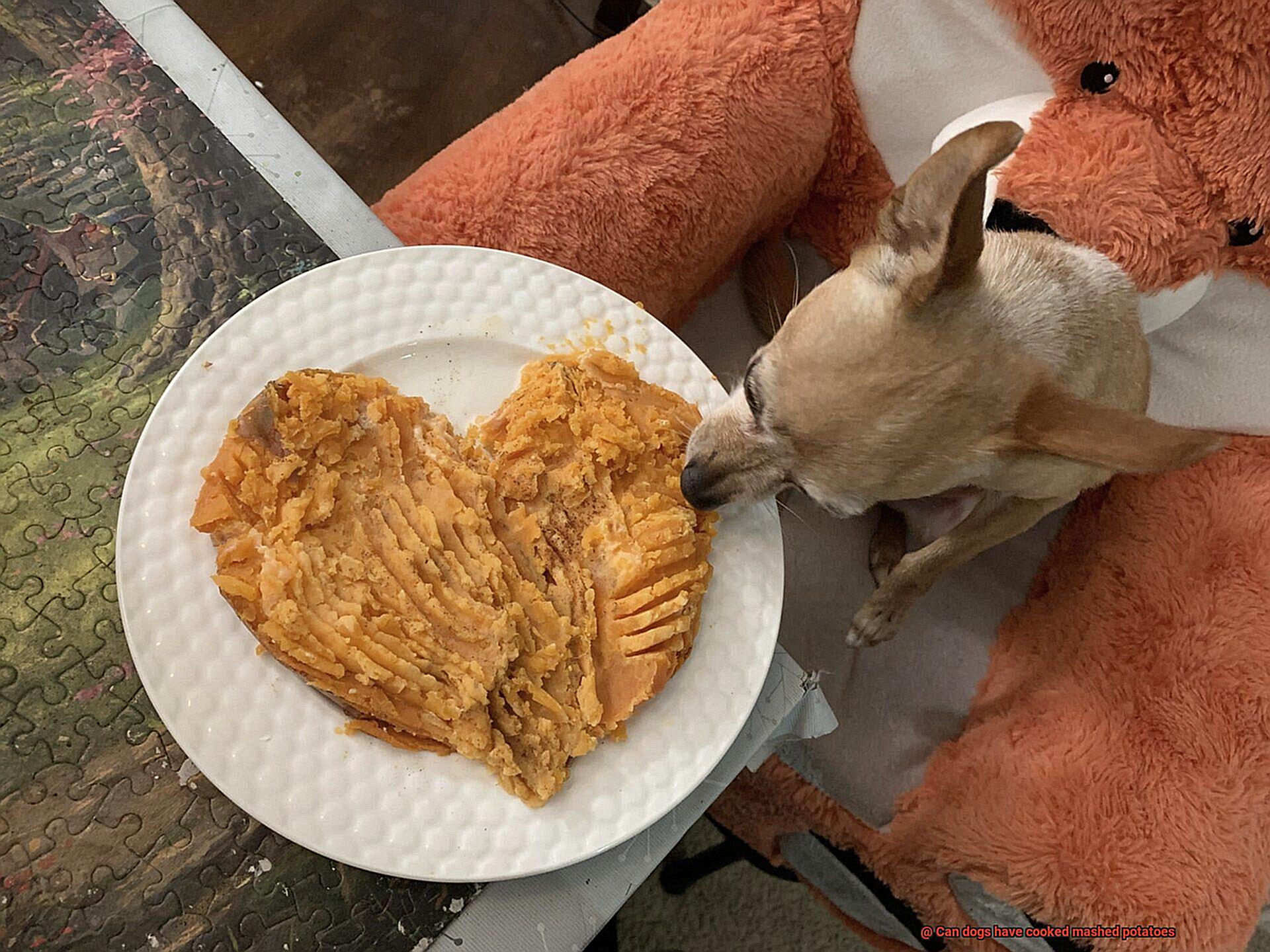
Before serving mashed potatoes to your French Bulldog, allow them to cool down completely. Hot food can burn their mouths and throats, causing discomfort and potential injury. Be patient; it’s worth the wait for both their safety and enjoyment.
Portion Control:
While mashed potatoes can be a tasty treat, it’s essential to remember that they should not replace a balanced and complete diet specifically formulated for dogs. Treat mashed potatoes as an occasional indulgence and ensure they make up only a small portion of your dog’s overall meal.
How Much Mashed Potato Can You Give To Your Dog?
As a French Bulldog owner myself, I understand the desire to share our favorite foods with our furry friends. Mashed potatoes can be a tasty treat for dogs, but it’s important to know how much is safe to give them. In this guide, we’ll explore the potential risks and benefits of feeding mashed potatoes to your French Bulldog and provide expert advice on portion sizes and ingredients.
The Risks:
While potatoes themselves are not toxic to dogs, it’s crucial to cook them thoroughly. Raw or undercooked potatoes contain solanine, a toxic substance that can harm your pup’s digestive system. Always serve cooked mashed potatoes to avoid any potential health issues.
Portion Control:
Moderation is key when it comes to feeding mashed potatoes to your French Bulldog. While they can enjoy this treat occasionally, it should only make up a small portion of their overall diet. A good guideline is to limit mashed potatoes to no more than 10% of their daily caloric intake. This ensures they receive a balanced diet and don’t become overweight or develop health problems like pancreatitis.
Ingredients Matter:
When preparing mashed potatoes for your French Bulldog, it’s important to avoid harmful ingredients like butter, cream, cheese, or excessive salt. These additions can be high in fat and lead to digestive issues or weight gain. Stick to plain mashed potatoes without any seasonings or additives. If you want to enhance the flavor, consider adding dog-friendly alternatives like a small amount of unsalted chicken broth.
Consult Your Veterinarian:
Before introducing mashed potatoes into your French Bulldog’s diet, it’s always best to consult with your veterinarian. They can provide personalized advice based on your dog’s specific needs and dietary restrictions. They may also recommend alternative options that are safer and more nutritionally balanced for your pet.
While French Bulldogs can enjoy mashed potatoes as a treat, it’s important to practice moderation, cook them thoroughly, and avoid harmful ingredients. Remember to consult with your veterinarian for professional guidance and to ensure your furry friend’s diet remains balanced and healthy.
What Other Foods Should Be Avoided When Feeding Mashed Potatoes To Your Dog?
But before you share this creamy delight with your French Bulldog, it’s crucial to know which ingredients can turn this treat into a tummy ache. Keep reading to learn about the foods you should avoid when feeding mashed potatoes to your four-legged friend.
Garlic: The Vampire of Mashed Potatoes
Garlic may add flavor to our beloved spuds, but it contains a compound called thiosulfate that can be toxic to dogs. Even small amounts of garlic can wreak havoc on your Frenchie’s health, causing anemia and other serious issues. So, unless you want your pup to howl like a werewolf, keep mashed potatoes with garlic far away from their bowl.
Onions: The Crying Game
Onions may make us shed a tear while we chop them, but they can cause more than just watery eyes for our furry friends. Like garlic, onions contain compounds that are toxic to dogs and can lead to anemia. Make sure your mashed potatoes are onion-free to avoid any tears of pain for your precious pup.
Butter and Dairy Products: Moo-ve Over, Sensitive Tummies
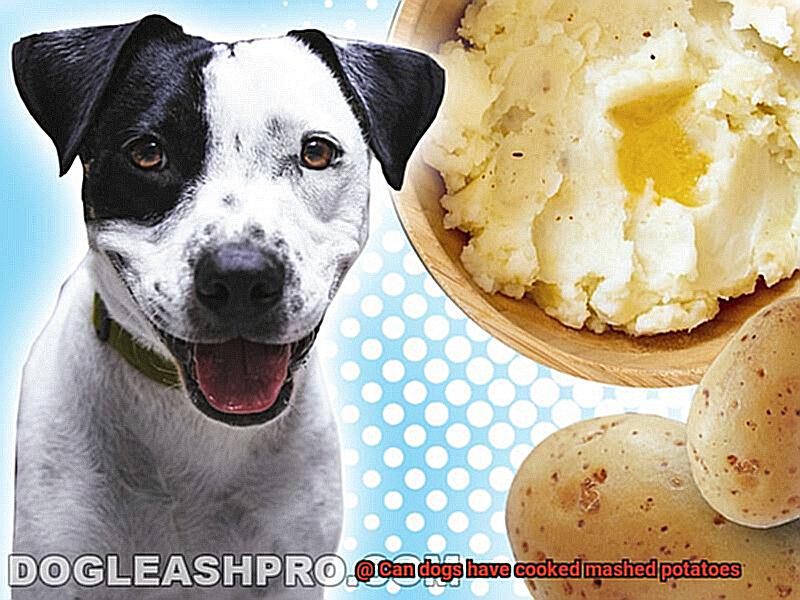
While a bit of butter in mashed potatoes won’t hurt most dogs, excessive amounts can lead to gastrointestinal upset and even pancreatitis in some cases. Additionally, some dogs are lactose intolerant or have allergies to dairy products. So, if your Frenchie’s tummy gets upset after enjoying mashed potatoes with butter or other dairy products, it’s time to switch to a lactose-free alternative.
Salt: A Recipe for Disaster
Too much salt is never good for anyone, including our canine companions. Excessive salt intake can cause sodium ion poisoning in dogs, leading to symptoms such as vomiting, diarrhea, tremors, and even death in severe cases. Keep your pup’s salt intake in check and avoid adding extra salt to their mashed potatoes.
Toppings: Gravy? No Way.
Gravy and sour cream may seem like the perfect finishing touch for our mashed potatoes, but they can spell trouble for our dogs. Gravy often contains onions, garlic, and excess salt – a triple threat for our furry friends. Sour cream, being a dairy product, can also cause gastrointestinal issues. Stick to plain mashed potatoes without any added toppings or seasonings to keep your Frenchie safe and satisfied.
What Are Some Signs Of An Allergic Reaction To Mashed Potatoes In Dogs?
We all want to spoil our furry friends with delicious treats now and then, but it’s important to be aware of potential allergies. Did you know that mashed potatoes could trigger an allergic reaction in your beloved Frenchie? In this guide, we’ll explore the signs and symptoms to watch out for, so you can keep your pup safe and healthy.
Signs of an Allergic Reaction:
- Itching and Redness: If you notice your Frenchie constantly scratching or rubbing their face, paws, or belly after eating mashed potatoes, it could be a sign of an allergic reaction.
- Swelling and Hives: Keep an eye out for any unusual swelling or the appearance of raised bumps on your dog’s skin.
- Digestive Issues: Vomiting, diarrhea, or excessive drooling may indicate an allergic reaction to mashed potatoes.
- Respiratory Problems: Sneezing, coughing, or difficulty breathing are serious signs that warrant immediate veterinary attention.
- Anaphylaxis: In rare cases, your Frenchie may experience a severe allergic reaction called anaphylaxis. This life-threatening condition requires immediate medical intervention.
Differentiating Between Allergies and Sensitivities:
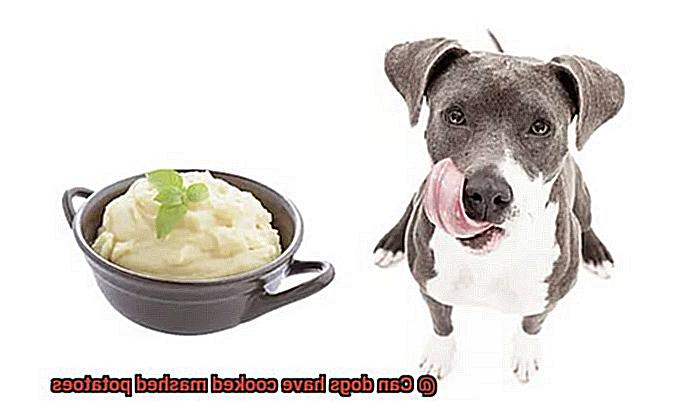
While allergies manifest through the signs mentioned above, some dogs may have a sensitivity or intolerance to potatoes in general. Keep an eye out for digestive issues like gas or upset stomach that are different from an allergic reaction but should still be monitored.
What to Do if You Suspect an Allergic Reaction:
If you suspect that your Frenchie is having an allergic reaction to mashed potatoes, don’t panic. The first step is to consult with a veterinarian who can perform tests to determine the specific allergen and provide appropriate treatment.
Prevention is Key:
To keep your Frenchie safe, it’s best to avoid feeding mashed potatoes or any food that contains potential allergens unless specifically recommended by your vet. Remember, your pup’s health and well-being are always the top priority.
How Can You Monitor Your Dog’s Response To Eating Mashed Potatoes?
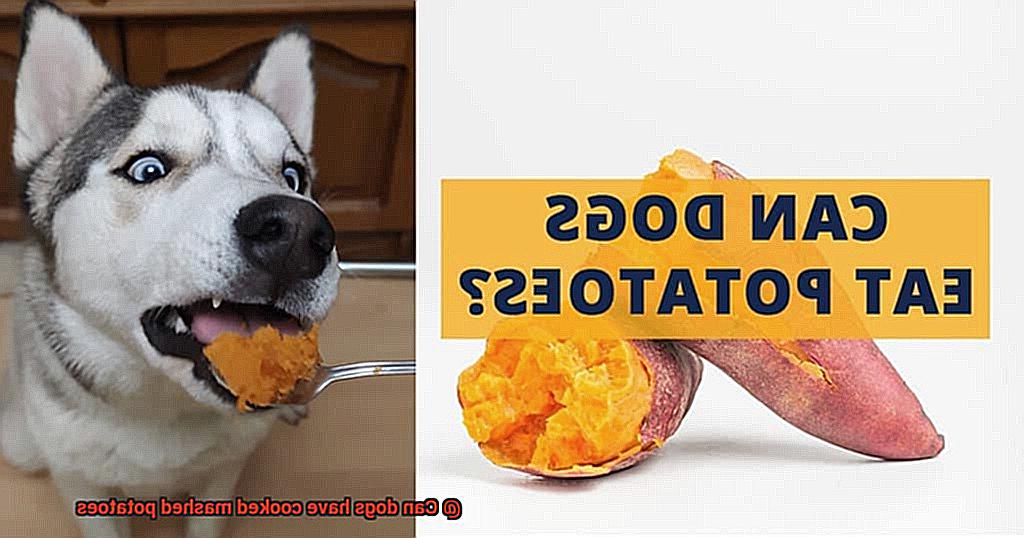
We all know how much we adore our furry friends and want to treat them to the best. But when it comes to feeding our Frenchies mashed potatoes, it’s essential to keep a close eye on their response. Here’s how you can monitor your pup’s reaction and make sure they stay happy and healthy.
First things first, pay attention to any immediate physical reactions or changes in behavior that your Frenchie may show after chowing down on those creamy mashed potatoes. Keep an eye out for signs of discomfort like vomiting, diarrhea, or excessive drooling. These could be red flags that your pup isn’t digesting the potatoes well.
French Bulldogs, like many other breeds, can be prone to food allergies or sensitivities. So if you notice any skin irritations, itching, or tummy troubles after your Frenchie indulges in mashed potatoes, it’s time to consult with your vet. They may recommend an allergy test to determine if potatoes should be off the menu.
Another way to monitor your dog’s response is by observing their energy levels and overall well-being. If your Frenchie seems lethargic or more tired than usual after eating mashed potatoes, it might be a sign that the food doesn’t agree with them. On the flip side, if they maintain their regular activity levels and appear energized, it suggests that they tolerate the spuds just fine.
Now, let’s talk about weight management. Mashed potatoes can be high in calories and carbohydrates, which can lead to weight gain if overfed. Keep an eye on your Frenchie’s weight and body condition score to ensure they stay in tip-top shape. Regularly checking their weight will help you adjust their portion sizes accordingly.
To keep track of your Frenchie’s meals and any changes in their health or behavior, consider keeping a food diary. Jot down the portion size of mashed potatoes you feed them, along with any additional ingredients or seasonings used. This information will come in handy when discussing your Frenchie’s diet with your vet or a canine nutritionist.
Remember, every Frenchie is unique, and their tolerance and response to mashed potatoes may vary. So, it’s important to monitor your pup closely and consult a veterinary professional if you have any concerns or questions about their diet or overall health.
ps8F_lh_YOk” >
Conclusion
In conclusion, while cooked mashed potatoes may seem like a scrumptious indulgence for our canine companions, it’s crucial to approach this treat with caution and make well-informed decisions. Mashed potatoes do offer some nutritional advantages, such as a dose of vitamins and minerals, an energy boost, and a low-glycemic alternative for certain medical conditions. However, there are also potential pitfalls that we must be mindful of.
One risk is the possibility of weight gain. Just like us humans, dogs can pack on the pounds if they consume too many starchy spuds. Digestive issues are another concern, as dogs may struggle to process the dense texture of mashed potatoes. Additionally, some dogs may have allergies or sensitivities to certain ingredients commonly found in mashed potatoes, such as garlic or onions. These additives can even be toxic to our furry friends.
To safely serve mashed potatoes to your doggie companion, it’s imperative to stick with plain cooked mash without any added butter, salt, garlic, or onions. Ensure that the potatoes are thoroughly mashed to eliminate any potential choking hazards or digestive discomfort. Start with small portions and closely observe your dog’s response before gradually increasing the quantity over time. Remember: moderation is key. Mashed potatoes should only be given as an occasional treat.
Before introducing mashed potatoes into your dog’s diet, it’s wise to consult with your trusted veterinarian. They possess the expertise needed to offer personalized advice based on your dog’s unique needs and dietary restrictions.
By being mindful of both the risks and benefits associated with feeding mashed potatoes to dogs and adhering to proper preparation techniques and portion control guidelines, you can guarantee that your four-legged friend can savor this delectable delight safely and in moderation.
